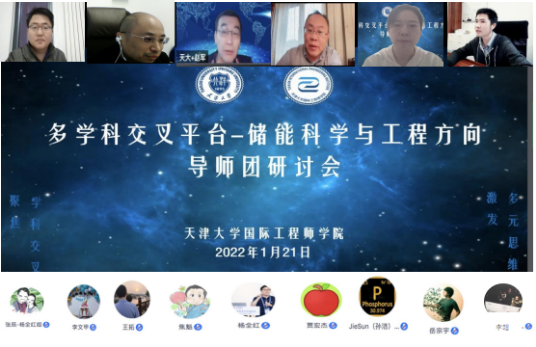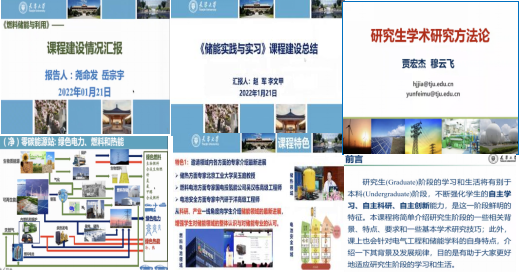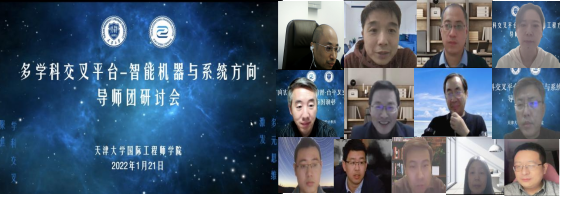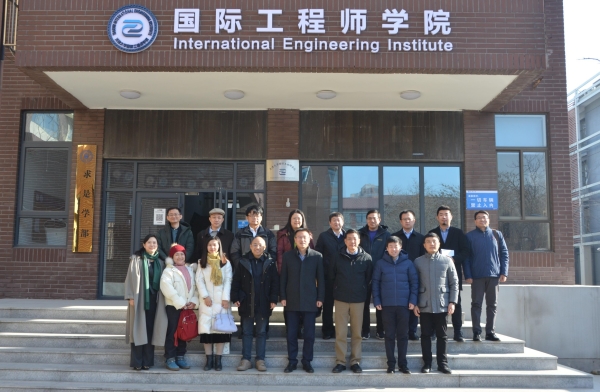Interdiscipline | TIEI Brings the Masters Together to Discuss the Interdisciplinary Platform
2022-01-22
Tianjin International Engineering Institute ("TIEI") brought together all "masters" of the supervisor group and held the supervisor group seminar on the interdisciplinary platform in the directions of Energy Storage Science and Engineering and Intelligent Machine and System respectively on January 21, to actively promote the construction of interdisciplinary platform, solve interdisciplinary difficulties, pool interdisciplinary strength, facilitate interdisciplinary thinking collision, incubate the results of interdisciplinary scientific research projects, and improve the overall talent training quality. All supervisors of the platform, Shan Xiaolin, Secretary of the Party Committee of Qiushi Honor College, and Guan Jing, Vice Dean of Qiushi Honor College (Deputy Dean of TIEI) attended the meeting. At the meeting, they had in-depth discussions concerning scientific research and innovation of the platform, special courses development, student training and management, etc.
Focusing on mission and leading scientific and educational innovations
l Energy Storage Science and Engineering
The seminar on Energy Storage Science and Engineering was presided over by Guan Jing.

Ø Scientific discussion
According to the requirements of the Action Plan for Discipline Development of Energy Storage Technology (2020-2024), supervisors engaged in the Energy Storage Science and Engineering made a detailed introduction and in-depth exchange based on their respective research fields and recent scientific researches of their students, to accelerate the construction of the Energy Storage discipline, deepen and promote dynamic integration of interdisciplinary talent training and industrial development.
In the principle of "facing the future, the world and the industry", supervisors took the opportunity of the national major development strategy to meet the needs of the national key projects of the national innovation platform for integration of production and education of energy storage technologies of Tianjin University by integrating the advantages in the research field, continuously optimizing research objectives and forming interdisciplinary forces, to promote the development of national energy storage technology, and train outstanding engineers and scientists capable of leading the progress and industrial development of energy storage technology in the future.
Ø Course development
In order to promote the development of special courses, Prof. Zhao Jun, the course leader, introduced the course Energy Storage Practice and Internship offered this semester at first, from teaching arrangement, teaching content and other aspects. Characterized by "enterprise experts teaching contributing to practice", the course invited experts in energy storage, fuel cells, battery safety and senior engineers of enterprises to introduce the latest progress in energy storage to students from the perspective of scientific research and industrial front-line, and encouraged students from different disciplines to discuss in groups and participate in experiments to promote interdisciplinary development. They also summarized experience and shortcomings in the course construction for reference to successfully carry out the characteristic courses in the next semester.
Subsequently, relevant course leaders introduced the arrangement and content of courses to be opened in the next semester one by one.
Starting from the question that "why do we need fuel energy storage? ", Prof. Yao Mingfa shared information about the course Fuel Energy Storage and Utilization. Being divided into seven sections, this course would teach students the cutting-edge knowledge they are very interested in by topics including energy development and fuel energy storage technology, full life-cycle assessment of carbon-neutral fuel, hydrogen production from renewable energy and hydrogen storage and transportation, and carbon-neutral fuel and thermal engine fuel technology.
Prof. Jia Hongjie introduced the course Academic Research Methodology at the Postgraduate Stage. In this course, the instructor would teach students how to reasonably arrange their scientific research and study at the postgraduate stage, as well as necessary skills for reading dissertations and writing papers and project applications by topics in three modules. At the same time, teaching contents would focus on high-capacity energy storage research, and stimulate students' interest in learning, to keep students more able to study and make scientific researches and innovations independently.
Prof. Jiao Kui introduced the course Fuel Cell Technology which would be offered to students from different disciplines and majors. Abundant case studies would enable students to learn more about the emerging energy development technologies with great development potential and application prospects.
The course leaders also had active discussions on and thoughtful considerations of the use of teaching resources and textbooks, practical arrangements and other aspects, while introducing the course, so as to ensure the course teaching quality.

l Intelligent Machine and System
The seminar on Intelligent Machine and System was co-chaired by Ma Kaixue, Dean of the School of Microelectronics, and Guan Jing.

Ø Scientific discussion
Facing the future challenges to mankind and major strategic needs of the state, supervisor engaged in the direction of Intelligent Machine and System had an overall consideration of the problems faced by intelligent machines and systems in a common direction, and seeking driving force from them, conducted thorough discussions in combination with highlights in various research fields. Based on the common understanding, they focused on critical technical problems of the future low-earth orbit intelligent micro-nano satellite terminals and their networking, and worked with advanced technical experts of the enterprise to refine the connection points of interdisciplines both in the top-down and bottom-up approaches, aiming to pool wisdom and efforts together within three to five years, implement the research interests and develop high-level leading talents who will lead the development of science and technology.
Ø Course development
Prof. Xu Degang, the course leader of Research Methodology opened this semester, shared the experience in course development for the purpose of building a high-quality course. Prof. Xu introduced this course as a general guiding course, and invited supervisors from different research fields in the direction of Intelligent Machine and System and enterprise leaders for co-teaching and co-building of a professional teaching force of TIEI. With the aim to optimize the scientific spirit, the instructor would integrate the main line of "what is interdiscipline and how to achieve interdisciplinary development" well into each thematic curriculum, guiding students to build a truth-seeking thinking mode. With highly frequent interactive discussions, students would be guided to button the top button of scientific research. It was also considered involving more enterprises in education in the following courses.
Prof. Xie Hui and Prof. Sun Tao, the course leaders, also gave an overall introduction to the courses to be opened next semester later.
Prof. Xie introduced the planning and design of the course Practice of Problem-Based Interdisciplinary Programs in detail from course orientation, overall ideology, target scheme, content arrangement, teaching organization, etc. Together with the course leader Prof. Ma Kaixue, Xie would lead all "masters" of the supervisor group to open the course, with a focus on the critical technologies of the future low-earth orbit intelligent micro-nano satellite terminals, to train students' abilities to integrate interdisciplines, forge ahead and make innovations, and organize and coordinate in all respects.
Prof. Sun shared the plan and arrangement of the course Frontiers of Intelligent Machine and System Technology. Sun stressed that the course would lead students to learn about the latest progress in innovative robot design, industrial robots, medical robots, unmanned driving and other research directions in the field of intelligent machine and system technology. By fully showing the perfect integration of Intelligent Machine and System in the field of AI and robot technology, this course would enable students to approach the frontiers of scientific and technological development, broaden their horizons and expand their research ideas.
At the seminar, supervisors carried out detailed demonstration and consideration of the course development, constantly sparking the "wisdom" of interdisciplinary development. Prof. Xie said affectionately in the exchange and discussion that "we will find solutions for all encountered difficulties. Teaching benefits teachers as well as students. We will learn and explore together with students".
Pooling efforts and resources to promote the growth of students
In order to build interactions and strengthen in-depth academic intersection, academic exchange and collision of thought between teachers and students, TIEI shared with supervisors the process of creating the "interdisciplinary workshop" for teachers and students, and determined the TIEI "Operation Plan of the "Interdisciplinary Workshop" after discussion. As required by the Plan, TIEI would organize and arrange scientific research exchange activities for students on a regular basis, develop the plan and theme and define the goal of discussion for each activity. Moreover, TIEI would arrange supervisors to guide students exchange, help students build academic thinking, lead students to expand their research interests, stimulate their diversified thinking and train their practical and innovative abilities.
Finally, Shan Xiaolin thanked supervisors for their strong supports to the construction of the interdisciplinary platform of TIEI, and then summarized the scientific research and study of students during the epidemic. In particular, Shan expressed heartfelt gratitude to the attending supervisors for their concern for students' scientific research, learning, life and thought, and emphasized that supervisors should remain responsible for education during the epidemic, and we all should fight against the epidemic and overcome the difficulties hand in hand.
In the future, TIEI and supervisors will continue to deepen the interdisciplinary development, pool efforts to key tasks, explore student management models, improve the student training quality and develop leading engineering talents with interdisciplinary background!
It is reported that in the principle of "interdiscipline, opening up and innovation" of Tianjin University, TIEI facilitated the further implementation of the Action Plan of Tianjin University for First-class Postgraduate Education. Focusing on major national strategic needs and the frontiers of science and technology, TIEI breaks the disciplines and school barriers, promotes the interdisciplinary and integrated enterprise-university training, and improves the innovations in of talent training by interdisciplinary integration, to accelerate the high-quality and intensive development of postgraduate education.



